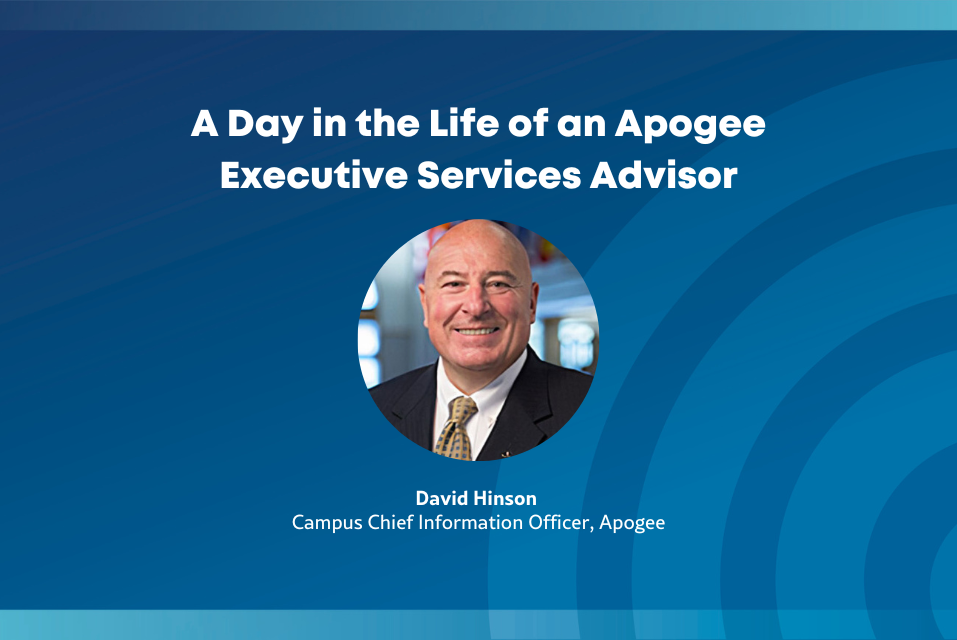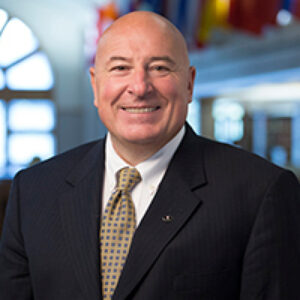Have you ever wondered what it’s like to be an Apogee Executive Services Advisor? To work as CIO professional embedded within a university’s leadership team, guiding them towards transformational and visionary technology strategies? Then let me tell you about my day-to-day experiences as an Apogee Executive Services Advisor.
My name is David Hinson and I have worked in technology for over 30 years, exclusively within higher education for the last decade and a half. I started my career in private industry serving in several leadership capacities, eventually transitioning to higher education as a chief information officer (CIO) and executive cabinet member at several colleges and universities. I know from long, firsthand experience the challenges that colleges and universities face when it comes to technology, from budget constraints to staff retention challenges to resistance to change.
Now, as an Apogee Executive Services Advisor, I apply that expertise and experience to helping colleges and universities navigate strategic – and often, existential – challenges.
On a typical day embedded at a college or university, I start by reviewing breaking overnight industry news and emerging technology trends. I need to stay abreast of the latest developments in higher education, pedagogy, employment, culture, and technology so that I can bring timely and valuable insights to our client schools. I also spend this time reviewing my calendar, anticipating any challenges that may arise with overbooking, identifying stakeholders I need to engage, or flagging meetings that may leave me too little time to move physically from one location to the next.
After that, I usually check in with my Apogee colleagues, a seasoned group of higher ed professionals with extensive backgrounds in campus operations, technology, and security. We discuss ongoing projects, client needs, and any new developments that are on our collective radar. This is typically the time we discuss at-risk engagements or client issues that require our immediate attention.
Since my role is to provide guidance and strategic planning based on my lifelong experience leading IT departments, I will spend the lion’s share of my day working directly with the institution’s IT staff. Together, we identify areas of needed improvement and collaboratively develop a roadmap for change, informed through direct observation, Apogee’s thorough IT and network assessments, and the institution’s desired “look of success” as stated through the engagement’s Scope of Work (SOW).
Throughout the day, I will meet with university leaders, such as the president, the school’s business officer, or the provost. It’s critical to get active and continual buy-in from top-level leadership when it comes to innovative technology initiatives and strategies. I strive to clearly communicate the strategy and tactics necessary to achieve an institution’s aspirational technology goals. Thoughtful and well-considered strategy is a force-multiplier in enhancing the student, faculty, and staff experience, shaped by, and informed through, the lens of actual shared governance.
One of the most rewarding parts of my job is working directly with students, faculty, and staff. I love being able to contribute to solving their real-life challenges, while also looking to address their larger problematic processes and workflows. Knowing that technology, and change itself, can be intimidating, I make it my utmost goal to clearly communicate problem-solving strategies and tactics in a way that lessens trepidation and is understandable to all stakeholders who have a hand in making transformative, lasting change a reality.
An indelible part of my “professional DNA” is staying organized. Since I manage multiple concurrent projects and deliverables, I must remain on top of competing and evolving priorities. I rely upon a combination of project management software, collaboration tools like Slack and Teams, and good old-fashioned to-do lists to keep track of everything that needs doing.
I will typically end each day by finishing any open communications I need to close, reviewing project statuses, and looking ahead to the following day’s meetings, presentations, and deadlines. One might say a defining “superpower” I have is the ability to look around corners and anticipate the unexpected, a skill won through practiced discipline and all that has gone before.
The Apogee Executive Advisors’ role is not only to be trusted advisors for our client schools, though that is foundational to our brand promise, but also to be seen as true colleagues who wear the school’s colors and become seamless extensions of the school’s leadership team. We take that responsibility and trust quite seriously.
Being an Apogee Executive Services Advisor is a challenging but eminently rewarding job. It requires deep hands-on expertise gained through successful leadership in higher education and a proven ability to partner with university leadership teams to create effective strategies for transformational technology change. It also requires exceptional communication skills and the ability to lead with the broad spectrum of campus stakeholders, including staff, students, and the highest-level cabinet leadership.
Because for our team of professionals, empowering campus leadership to improve student experiences and lives is the very embodiment of Apogee’s brand promise and mission statement – Higher Education is our Higher Purpose.
I can’t think of many higher callings than that.
To connect with me about how our team of Executive Advisors can help your campus, please fill out this short form.





